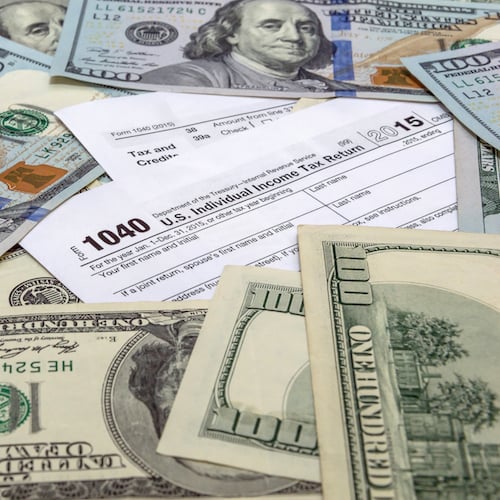
The U.S. government collects a portion of every working American’s paycheck. States are free to levy an additional income tax. While taxes on individual incomes are a significant source of revenue for most states, a handful of states have no individual income tax.
24/7 Wall St. reviewed state level tax codes using tax data compiled by tax policy research organization Tax Foundation.
[in-text-ad]
The seven states with no income tax are: Alaska, Florida, Nevada, South Dakota, Texas, Washington, and Wyoming. These states are not clustered in any particular region, although none are in the Northeast.
Click here to see the states with no income tax.
In an interview with 24/7 Wall St., Morgan Scarboro, policy analyst with the Tax Foundation, explained that many of these states see individual income tax as economically harmful. Income taxes are paid by individuals, who earn income at a job or as business owners. For Scarboro, such income is what stimulates economic growth, and these taxes, “can discourage investment,” she said.
States collect taxes from a range of sources in order to fund public services and budget obligations. Individual income taxes account for 36% of tax collections across all states. The seven states with no individual income tax need to compensate with revenue from other sources.
There is no one-size-fits-all state tax policy. A myriad of cultural, historical, and economic factors help explain the differences in state tax structures. At the root of a state’s tax system is what Tax Foundation experts characterize as a deal between residents and their governments.
In other words, the level of taxation in an area is tied to the level of services desired by citizens, which for Scarboro, is “heavily dependent on the state.” Some states with extremely high taxes also provide excellent public services, while some states with low taxes provide comparatively few services.
A state’s resources and industrial composition heavily influence tax policy. Alaska and Wyoming make up for lost income tax revenue through severance taxes on resource extraction. Other states, like Florida and Nevada, fund public services and meet budgetary obligations largely with sales tax revenue from tourism.
On the whole, the states with no income tax collect less in taxes. Five of the seven states reported lower-than-average state and local tax collections in fiscal 2015.
A state’s tax policy is by no means set in stone. For example, though Alaska has not levied a personal income tax since 1980, state lawmakers are currently considering a bill that may end the longstanding trend. For decades, Alaska has been able to rely heavily on severance taxes on oil and gas production to fund government operations. However, since global oil prices fell in 2014, the state’s coffers have all but dried up.
On the other side of the equation, Tennessee may soon join the ranks of states with no individual income tax. Currently, the state only taxes interest on dividend income above a certain threshold. However, the Tennessee General Assembly recently passed legislation that will phase out the state’s only form of income tax by 2022.
To identify the states with no income tax, 24/7 Wall St. reviewed the tax code in each state using the latest tax data compiled by tax policy research organization Tax Foundation. Personal income per capita for each state is for 2015 and came from the U.S. Bureau of Economic Analysis. State individual income tax collections per capita are for fiscal 2015; state and local property tax collections per capita are for fiscal 2014; state general sales tax collections per capita are for fiscal 2015 — all from the “Tax Foundation’s Facts & Figures 2017: How Does Your State Compare?” report. Sales tax rates, including combined rates, gasoline excise tax rates, cigarette excise tax rates, spirit and wine excise tax rates are as of January 1, 2017 and were also provided by the Tax Foundation.
These are the states with no income tax.

Source: Thinkstock
1. Alaska
> 2015 personal income per capita: $56,147 (5th highest)
> 2014 state & local total tax collections per capita: $7,555 (3rd highest)
> 2014 state & local property tax collections per capita: $2,639 (4th highest)
> Sales tax rate: N/A
Alaska is one of only seven states with no individual income tax. One of the nation’s top oil producing states, Alaska has historically raised the lion’s share of its revenue — as much as 90% in some years — by taxing oil and gas production. With revenues from the oil severance tax, Alaska has not levied an individual income tax since 1980.
That may soon change, however. After the price of oil fell precipitously in 2014, oil producers in Alaska began losing money. The state has collected virtually no revenue from the severance tax in the last two years. In order to generate and stabilize government revenue, legislators introduced House Bill 115 last month. If passed, taxpayers will pay a state income tax equivalent to 15% of federal income taxes collected.
[in-text-ad]

Source: Thinkstock
2. Florida
> 2015 personal income per capita: $44,429 (23rd lowest)
> 2014 state & local total tax collections per capita: $3,322 (5th lowest)
> 2014 state & local property tax collections per capita: $1,184 (22nd lowest)
> Sales tax rate: 6.00% (16th highest)
Individual income tax is constitutionally banned in Florida. Florida compensates for the lack of income tax revenue with revenue from other sources. One of the most popular tourist destinations in the country, Florida relies heavily on sales tax revenue generated by the tens of millions of tourists visiting the state each year. An estimated 105 million people visited Florida in 2015 alone, the most in the state’s history. The sales tax rate of 6% in Florida is one of the higher rates in the nation.
Despite the revenue generated from the state’s relatively high sales tax rate, Florida’s revenue remains relatively low. The state collected $3,322 per capita in fiscal 2014, the fifth lowest of any state.
4

Source: Thinkstock
3. Nevada
> 2015 personal income per capita: $41,889 (14th lowest)
> 2014 state & local total tax collections per capita: $3,875 (19th lowest)
> 2014 state & local property tax collections per capita: $953 (13th lowest)
> Sales tax rate: 6.85% (8th highest)
States usually only eliminate individual income tax if public services can be provided and budgetary obligations can be met with revenue from other sources. Nevada brought in $876 million from gaming taxes and licensing fees alone in fiscal 2016 tourism and gaming industries. About 86% of that revenue came from Clark County — home of Las Vegas. The city attracted some 42.9 million visitors in 2016.
Gaming is not the only way tourists help foot the bill for government services in Nevada. The state levies a 6.85% sales tax on goods and services purchased in the state, nearly the highest sales tax rate in the nation.

Source: Thinkstock
4. South Dakota
> 2015 personal income per capita: $47,881 (21st highest)
> 2014 state & local total tax collections per capita: $3,684 (14th lowest)
> 2014 state & local property tax collections per capita: $1,301 (24th lowest)
> Sales tax rate: 4.50% (14th lowest)
South Dakota has not levied an individual income tax since the middle of World War II. Lawmakers repealed South Dakota’s income tax in 1943, when the state was benefitting from strong sales tax revenue. With no income tax, South Dakota is alone among Midwestern states, and it is unlikely that an income tax will be introduced any time soon. Two constitutional amendments require a voter initiative or approval from a two-thirds majority of both state legislative bodies.
A low-tax state in general, South Dakota also has no corporate tax. With low taxes, the state has lower than average revenue. South Dakota collected $3,684 in taxes per capita in fiscal 2014, versus the average per capita state and local tax collection of $4,675.

Source: Thinkstock
5. Texas
> 2015 personal income per capita: $46,947 (24th highest)
> 2014 state & local total tax collections per capita: $4,045 (23rd lowest)
> 2014 state & local property tax collections per capita: $1,635 (14th highest)
> Sales tax rate: 6.25% (13th highest)
The lack of a personal income tax in Texas was touted by former Gov. Rick Perry as the primary reason the Lone Star State weathered the recession better than most.
Like several other states with no income tax, Texas has higher than average property and sales taxes. State residents paid an average rate of 1.6% of their home value in property taxes in 2015. In comparison, homeowners nationwide pay an effective property tax rate of 1.1%. Similarly, the state levies a 6.3% tax on goods and services, higher than a majority of states. Texas collected $1,226 in sales taxes per capita in fiscal 2015, the sixth highest sales tax collection of all states.
[in-text-ad]

Source: Thinkstock
6. Washington
> 2015 personal income per capita: $51,898 (12th highest)
> 2014 state & local total tax collections per capita: $4,557 (19th highest)
> 2014 state & local property tax collections per capita: $1,364 (24th highest)
> Sales tax rate: 6.50% (9th highest)
Washington state residents pay more in taxes on certain goods and services than most Americans. The state charges an 18.8% cell phone tax, a combined $31.48 per gallon tax on spirits, and a 49.4 cent per gallon tax on gasoline, each the highest such taxes of any state. With its 6.5% general sales tax rate, the state collected $1,746 per resident in fiscal 2015, the third most in the country.
High excise and sales taxes are necessary to balance the state budget, as Washington does not tax individual income. Washington voters have rejected a personal income tax a number of times in the past, including a 2010 bill that would have taxed the top 1% of earners in the state.

Source: Thinkstock
7. Wyoming
> 2015 personal income per capita: $56,081 (6th highest)
> 2014 state & local total tax collections per capita: $5,943 (7th highest)
> 2014 state & local property tax collections per capita: $2,109 (9th highest)
> Sales tax rate: 4.00% (11th lowest)
Wyoming is one of only a handful of states with no corporate or individual income tax. Despite lacking these traditional sources of revenue, the state collected $5,943 per capita in fiscal 2014, the seventh highest collection of any state. Like other resource-rich states, much of Wyoming’s revenue comes from severance taxes. The state taxes the value of surface coal at 7%, oil and natural gas at 6%, and trona — a widely used mineral found in baking soda and other household goods — at 4%. The state generates a substantial amount of revenue from these taxes. Wyoming is the top coal producing state, accounting for two-fifths of all coal mined in the United States. Additionally, Wyoming is home to the world’s largest known deposit of trona.
Sponsored: Attention Savvy Investors: Speak to 3 Financial Experts – FREE
Ever wanted an extra set of eyes on an investment you’re considering? Now you can speak with up to 3 financial experts in your area for FREE. By simply
clicking here you can begin to match with financial professionals who can help guide you through the financial decisions you’re making. And the best part? The first conversation with them is free.
Click here to match with up to 3 financial pros who would be excited to help you make financial decisions.
Thank you for reading! Have some feedback for us?
Contact the 24/7 Wall St. editorial team.
 24/7 Wall St.
24/7 Wall St.
